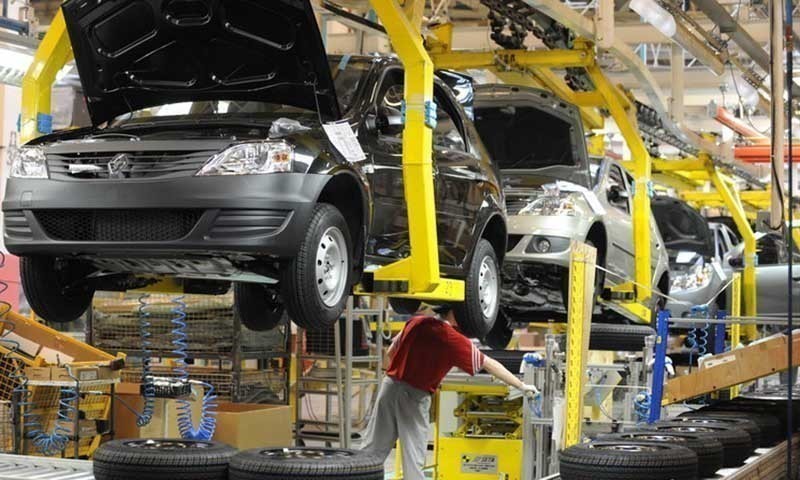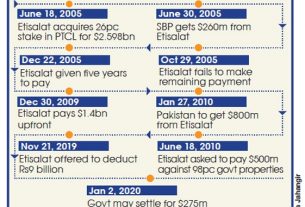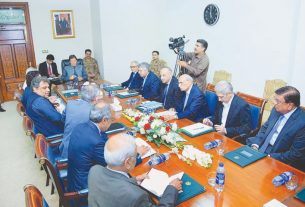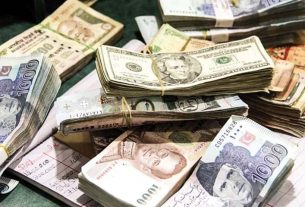Following a drop of up to 72 per cent in automobile sales in the first half of 2019-20, stakeholders in the auto sector say dark clouds will likely continue hovering over the sector in January-June.
Issues like high prices on account of the federal excise duty ranging from 2.5pc to 7.5pc on engines of different horsepower, additional customs duty on raw material imports, record high interest rates and strict vigilance by the Federal Board of Revenue (FBR) still persist.
However, January and February are considered better months for sales. People resume buying after suspending their purchases in November and December in anticipation of a change in model.
The first half of 2019-20 also saw non-production days (NPDs) at many assembling units followed by plant shutdowns for longer durations, especially in tractor units. Unsold inventories piled up at plants and dealerships, forcing a large number of workers in the auto-part industry to stay out of work.
The government did not play any role in checking multiple price increases by car and bike assemblers. The frequent price hikes were justified on account of the dropping value of the rupee against the dollar, which nullifies the assemblers’ claim about higher localisation. Although the exchange rate finally reverted to Rs155 after swelling to Rs164 in June 2019, car and bike prices continued to rise.
‘Nobody wants to go for expansion because of poor economic and political conditions’
Greenfield and brownfield investors who put in over $1 billion under the Auto Development Policy 2016-21 are also operating in an unfriendly business environment amid depressed demand.
Under Category A, 18 investors have been granted the greenfield status since 2016. Two closed-down units have also been revived under the brownfield status. Regal Automobiles, United Motors, Master Motors, JW Foreland, Kia Lucky Motors and Hyundai Nishat Motors have already started car and SUV production.
However, the fate of two entrants — Al-Futtaim Renault and Ghandhara Nissan Datsun — hangs in the balance with the possibility of them pulling out of Pakistan.
Assemblers are cautiously optimistic about their sales outlook in the second half of 2019-20. Hinopak Motors Vice President for Production and Business Operations Naushad Riaz said, “I don’t see any chance of growth in the next six months. We are praying for stability at least for the next few months to avoid any further losses.”
The situation is uncertain, he added, noting that “nobody wants to go for further expansion and investment mainly due to poor economic and internal political conditions and negative growth in large-scale manufacturing”.
“Poor sales will continue in the next six months in the truck and bus sector,” he said, adding that the next budget will be a test case for the government.
On NPDs, he said Hinopak Motors had observed three to four NPDs in the first half of 2019-20. However, there was no NPD November onwards.
As for job losses, he said some people left the company for new entrants during the last one year. Vendors and suppliers suffered badly.
Mr Riaz was of the view that the issue of filers and non-filers started the sales slowdown. Later on, other factors worsened the situation.
Pakistan Association of Automotive Parts and Accessories Manufacturers (Paapam) Chairman Capt (retired) Mohammad Akram, who recently grilled auto assemblers for low localisation and high prices, called July-December 2019 a turbulent period for the auto vending industry in terms of unemployment.
On average, production fell by more than half in all sectors of the auto industry, he said. Being directly related to production, almost 50pc of manpower lost jobs, he claimed.
Sector-wise, he said the tractor industry virtually collapsed. The car industry is also on the verge of collapse owing to a massive fall in demand.
Heavy vehicles have a very small share in terms of localisation, which we wish to increase, he added.
The Paapam chief said tractor assembling plants and their vendors are almost closed in view of the massive drop in production and sales. The government should patronise the agriculture sector by helping farmers purchase tractors through soft loans via the Agriculture Development Bank of Pakistan (ADBP), he said. This loan facility for farmers is almost nonexistent because of a lack of funds at ADBP and high mark-up rates.
As for the next six months, he said auto sales are not going to grow significantly.
The auto industry needs a stimulus from the government to reduce car prices. This can happen by reducing some taxes that, in turn, will increase sales besides improving tax revenues, recouping lost jobs and generating additional industrial activity.
He said the government does not have any control over final car prices. Part suppliers do not get any benefit out of car price hikes, he insisted.
Millat Tractors Ltd Senior Executive Director Sohail Bashir Rana looks slightly upbeat as he expects a recovery in sales from February in view of Rabi crops in Sindh and Punjab.
“Despite some improvement in sales from February, I am still anticipating a 30-35pc drop in 2019-20 versus 2018-19,” he said.
Mr Rana said farmers were hit because of the low production of cotton and rice besides issues surrounding sugar cane crushing, which made growers reluctant to buy tractors. A high input cost owing to rising fertiliser prices also kept growers away from tractor buying.
Tractors are also used in non-agricultural activities like the hauling of construction materials in public as well as private projects. Unfortunately, the pace of these development projects also remained slow in 2019, he said.
Sohail Usman, CEO of Regal Automobiles and maker of Prince 800cc car, said the January-June period will not witness a big boom in sales.
“I see only 5-6pc growth in the second half of 2019-20 owing to a shift of consumers towards new models being introduced by Chinese and Korean assemblers.”
The market is not witnessing new buyers in large volumes amid an intense war among new and old players.
Giving an example, he said a new Korean SUV introduced by Kia Lucky Motors has snatched away the buyers of Honda Civic and Toyota Fortuner. “This means buyers are the same but their preferences have changed.”
Regal Automobiles plans to launch locally assembled Prince 800cc cars by the end of this month followed by the introduction of an imported SUV in March, which will later be assembled locally.
Regal Automobiles also assembles Road Prince bikes. “Bike sales from January to June will likely remain the same owing to the shrinking buying power of consumers,” he said.
According to a leading Japanese assembler, the expectation for a revival in car sales is low in the second half of the current fiscal year.
“The fear factor has gripped buyers. They are reluctant to make new purchases owing to the documentation drive by the FBR.”



